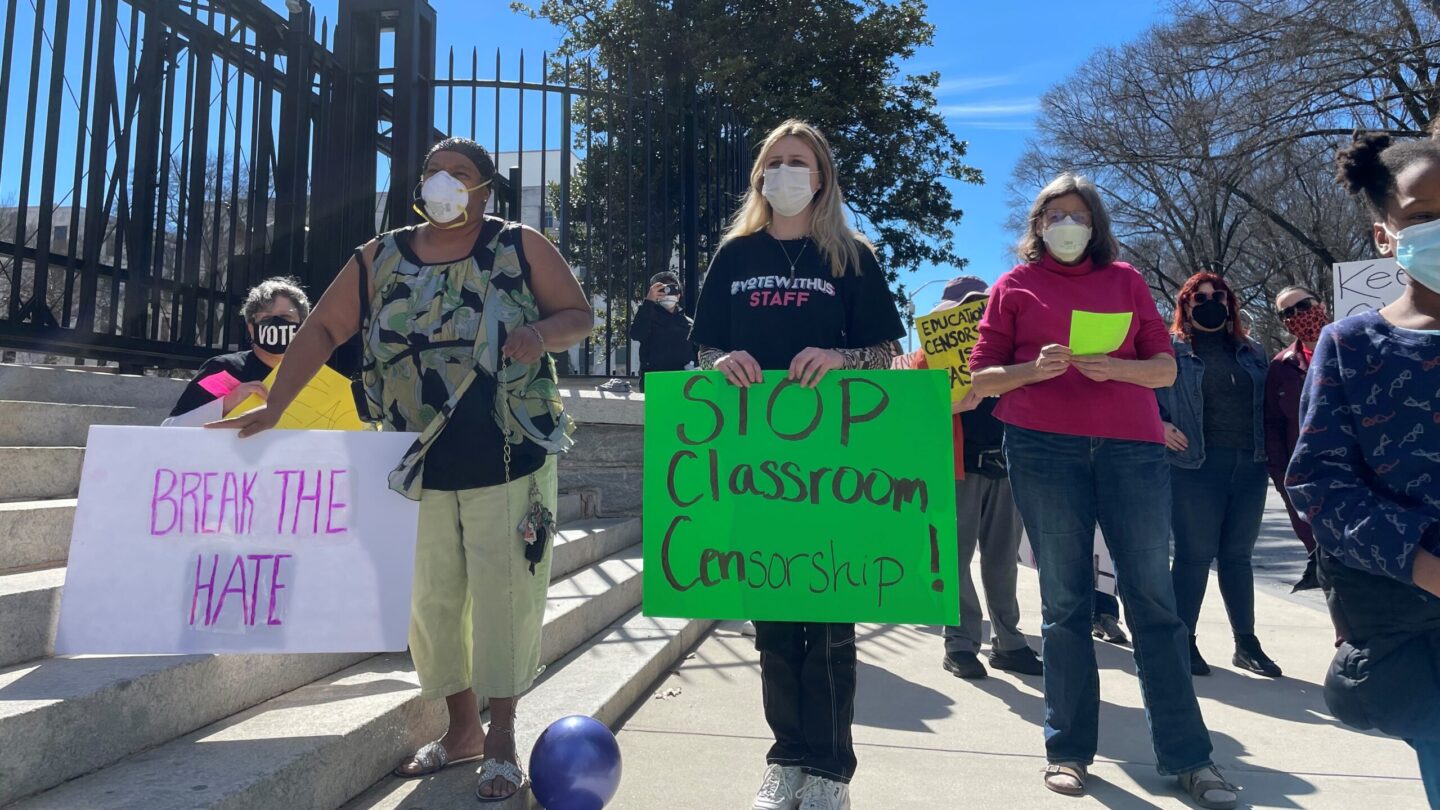Georgia GOP passing a flurry of controversial education bills. Democrats ask, 'Why now?'

For two weekends in a row, protesters gathered outside Georgia’s capitol to condemn a slate of Republican-backed education bills now moving through the legislature.
Parents, students and teachers waved signs with slogans like “Teach the truth” and sang an old civil rights anthem, “Marching on to Freedom Land.”
The bills include strict limits about how teachers talk about race in schools, a ban on transgender kids playing on the sports team that matches their gender identity and a bill that makes it easier for parents to complain about specific materials in school libraries.
“We will remember in November,” Atlanta NAACP Vice President Gerald Griggs said into a megaphone, directed at the Capitol. “So while you’re trying to appeal to a certain type of voter in Georgia, Georgia has changed.”
Republicans have reason to think education is a resonant issue — and not just in primaries. In Virginia last fall, Glenn Youngkin campaigned for governor on unmasking kids and banning critical race theory. He won and became Virginia’s first Republican governor in years.
A key moment came during a debate, when the Democratic candidate Terry McAuliffe said, “I don’t think parents should be telling schools what they should teach.”
The GOP replayed the clip over and over in campaign ads.
“It is a soundbite for what many parents feel is the opinion of the policymakers that their input is not needed and is in fact counterproductive,” says Chuck Clay, who served for years in the Georgia General Assembly and now lobbies on education issues.
Clay says politicians cannot discount parents’ frustration over schools coming out of the pandemic these last two years.
“If you don’t hear that message loud and clear, Democrat or Republican, then you’re missing the boat,” he says.
State Sen. Elena Parent, a Democrat on the Senate Education and Youth Committee, says Georgia Republicans looked at Virginia and saw how education issues helped the GOP walk a fine line between pleasing their base and appealing to independent-minded voters.
“Republicans were searching around for an issue to motivate their voters and they didn’t really want it to be Trump because he had proven to be pretty toxic and divisive and not necessarily a good spokesperson for suburbanites and suburban moms,” Parent says.
In Virginia last fall, voters who listed education as their top priority voted for the GOP by 6 points. Overall, white women in Virginia swung 14 points toward the Republicans. That’s after they basically split between Joe Biden and Donald Trump in 2020.
Georgia’s array of education bills emerged in a “combustible environment,” Parent says. The country had been protesting and reckoning with racial injustice, and the pandemic spurred mask requirements and virtual learning.
Parent says some of this anger is legitimate, like parents wanting their kids in school, but Republicans also capitalized on their frustrations.
Democrats need to amplify their own education message, Parent says, and make it clear that Republican efforts to hamper how teachers talk about race, for example, distracts from the real challenges facing schools now.
“We want every child to be able to have an excellent education with high-quality professions that are paid what they’re worth, and frankly, until we do that, our schools will continue to struggle, and that has nothing to do with whether or not a child is exploring how slavery and Jim Crow may have had an effect on Black Americans today.”

This session, Georgia Republicans have introduced more than half a dozen education bills.
“Education issues are going to be a big factor in whether we see a red wave in Georgia or a continued blue wave,” says Republican state Sen. Clint Dixon, who introduced a Parents’ Bill of Rights and legislation allowing parents to opt their kids out of school mask mandates.
He says focusing on schools isn’t about politics — it’s about listening to his constituents.
“I tell some of my Senate colleagues in the caucus, their primary issue is election integrity,” he says. “In Gwinnett, it’s education. I’ve got parents who voted for my opponent last time that plan on voting for me this time because I’ve taken up these issues they care about.”
Karen Watkins, a Democrat on the Gwinnett County School Board, says these bills will have consequences beyond politics. She says they aren’t just about transparency or parental choice. They lean into cultural wedge issues, like race and gender.
“I can’t see anything, anything, in any of these bills built on fear, that would actually help the children,” she says.
When Watkins won her seat in 2020, she was among the first women of color to sit on the school board. She did not expect the vitriol she faced — at board meetings, in emails and phone calls. Watkins says these divisive bills and the politics around them ratchet up the temperature.
“It’s just troubling to me because education should be the thing that brings us together, not divides us,” she says. “Because that’s the one thing we all have in common. It’s the center of our community.”
Watkins says she’s not sure it’s possible to walk it back now, but she says it’s important to try.
At the end of the day, Watkins says, it’s students who will most intimately feel the fallout.








